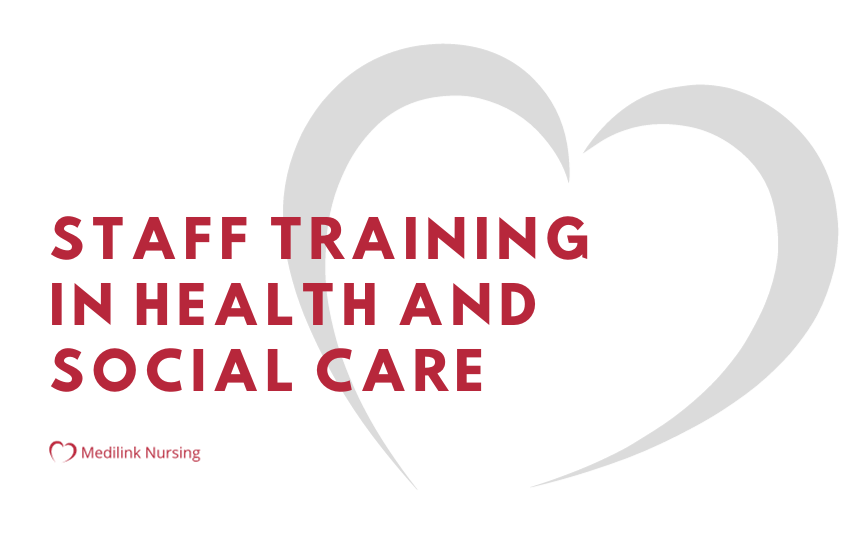Importance of Staff Training in Health and Social Care
If your business operates in the Health and Social Care sectors, it’s crucial that your staff receive regular, up-to-date, high-quality training. Not only is it required to meet regulatory standards, but providing care is a serious matter, deeply affecting the lives of those in your care. Securing the best outcomes through regular training is something care providers should all work towards!
In this article, we’ll go over the reasons for, and advantages of staff training in health and social care, as well as the different ways of accessing training courses.
Reasons for Staff Training in Health and Social Care – Regulations
It’s a CQC regulatory requirement to ensure that health & social care staff receive regular training, among other things. This is as good a reason as any to invest in staff training courses, as without them, the CQC could issue your organisation with penalties.

Reasons for Staff Training in Health and Social Care – Staffing
Often overlooked, another important reason to provide staff with regular training is that it improves staff retention rate (at the same time as making your staff more skilled & experienced workers).
There are a lot of talented people working in our industry, but finding the right person for your role can be a challenge, and you’ll want to keep them around as long as possible once you’ve found them. Providing regular training and development opportunities makes employees feel more valued, and gives them a sense of professionalism, confidence, and progress – great for motivation and morale, as well as technical ability.
What is Staff Training in Health and Social Care?
The types of training required vary from role to role. In a Residential Home setting, the following courses are considered ‘mandatory’ to meet guidelines and pass inspections:
- Health & Safety
- Fire Safety
- Equality & Diversity
- Infection Prevention and Control
- Manual Handling
- Safeguarding Adults/Safeguarding Children
- Basic life support and first aid
- Food Hygiene
- Managing medicines
- Documentation and record keeping
- Mental capacity and deprivation of liberty (DoLS)

Challenges of Traditional Training Methods
One of the greatest challenges associated with training is the costs involved. Paying a face-to-face trainer to visit, along with paying all the participants to attend, and if necessary paying other staff to cover the attendees’ shifts, costs can quickly mount.
The Forgetting Curve
What’s more, people tend to forget about training, and quickly too. Research shows that attendees of corporate training courses forget around 50% of the course’s content within an hour of it ending, and 70% within 24 hours (click here for the article).
This doesn’t mean they’re useless, the brain is simply retaining what it deems most important/interesting. In fact, this is why repeated training is so important – we can’t all remember everything the first time!
That said, it’s making less and less financial sense nowadays to use in-person training, outweighing any unique advantages it offers.

Online Training Courses As An Alternative
Nowadays, many businesses are using online services for staff training in health and social care. There are a lot of perks to doing things this way, such as:
Lower Costs
The cost of sourcing training courses online is a lot cheaper than using in-person trainers, but provide the same level of legal/regulatory coverage.
Increased Frequency
We mentioned the Forgetting Curve, highlighting the importance of regular training. Well, since online courses are so affordable, you can offer far more frequent courses for your staff than otherwise.
Alternatively, you could keep the frequency the same and try a few new courses, expanding their knowledge and providing opportunities for professional development!
Ease of use
Online courses can be completed anywhere, at any time – no need to set aside training days. Online courses can be done from any device with internet access too, so your staff can complete them anywhere. If home is more convenient for them, no problem.
You should still pay your staff for time spent completing mandatory courses, even if it’s outside their regular hours. Besides legal concerns, quibbling about this will reduce morale and goodwill between staff and management.
1-to-1 Interactivity
Although online training courses are often seen as less effective than in-person courses, there is one key advantage: Online courses can often be more interactive than in-person training, as the session takes place 1-to-1 and asks the trainee regular questions, keeping them more engaged. A good way to flatten the Forgetting Curve!

Training Courses By Medilink Nursing
Medilink Nursing has teamed up with HR services provider Aaron’s Department to create a range of online training courses, available for your business to use!
To view our dedicated training courses page, click the button below:
If you’re interested, give us a call on or email and enquire – we’ll provide prices, and answer any questions you might have. We look forward to hearing from you!
Further Reading:
If you found our page, “Staff Training In Health And Social Care” useful, you might enjoy reading our other pages:
Our training fees
Finding nursing staff quickly with Medilink Nursing
Request pay rates

